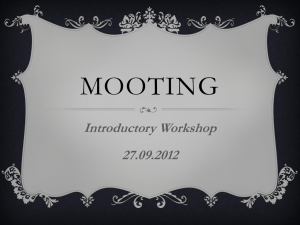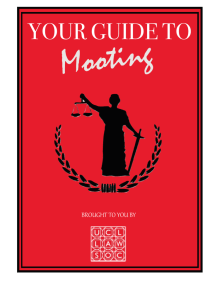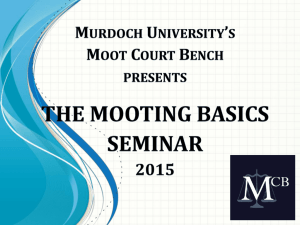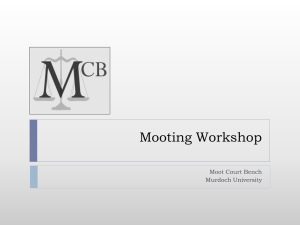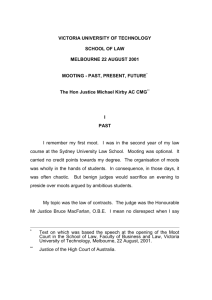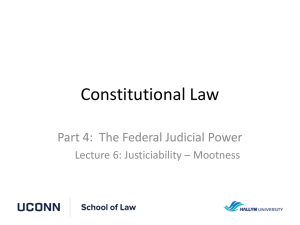An introduction to mooting - University of Auckland Mooting Society
advertisement
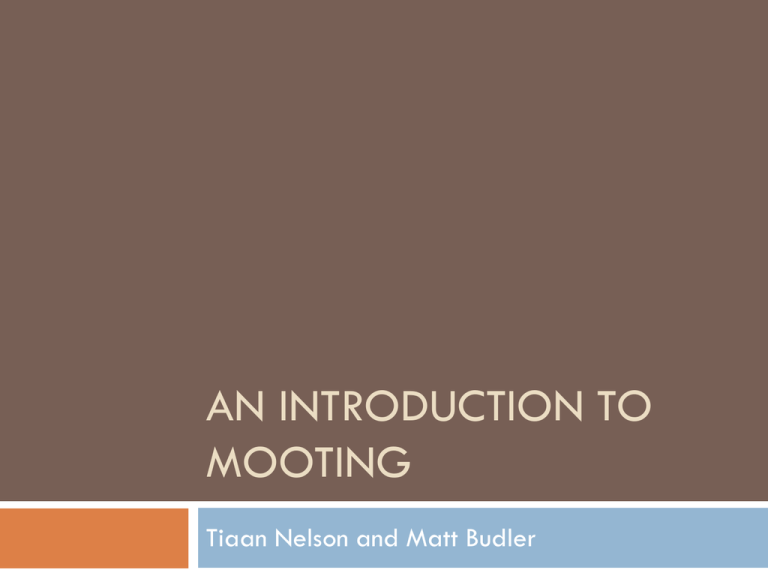
AN INTRODUCTION TO MOOTING Tiaan Nelson and Matt Budler Structure of today’s session Introduction Preparing for your first moot Written submissions Oral submissions General tips Mooting Society Questions? Introduction Introduction What is mooting? Participants, or "mooters", take part in simulated court proceedings, which usually involves the submission of written briefs and presenting oral arguments. The problems that participants are asked to write on explore complex legal issues, usually at an appellate level. Mooting is an invaluable skill that aids your legal research, presentation and communication abilities. Introduction Why should I do mooting? There are compulsory moots at law school, but doing extracurricular moots is a great way to learn more about the law and impress future employers. An excellent networking opportunity. Use your legal skills in a practical context. Improve your legal reasoning, legal research and public speaking skills. Learn to think on your feet. If you do well, you get heaps of free trips, food and alcohol. Introduction What mooting isn’t. Mooting isn’t about giving a speech. A moot is not a debate. While debating may have been useful for building up your confidence to speak in public, we suggest you forget all other debating habits or it might cost you in a moot. Mooting isn’t just about being able to speak in public It’s not uncommon for presentation to only make up 25% of the marks, the rest of the marks will be divided between knowledge of the law, ability to respond to questions, ability to depart from prepared speech etc. Preparing for your first moot The problem Read the problem. Identify the obvious arguments and counterarguments. Read the problem a couple more times. Know all of the facts very well. Make sure you spot all of the issues. Don’t worry if the problem is on an area of law you don’t know or haven’t studied. All of the information you need to make your submissions will be provided in the prescribed cases. Research Closed authority moot. You will be provided with a list of cases. You are only allowed to cite cases on that list and other cases to the extent that they were cited in cases on the list. Read all the cases (twice). Split the issues within your team – there will normally be an obvious division of issues in the problem. Use other sources for ideas / to aid your understanding even if you are not allowed to cite them. Other cases. Commentary: Adams on Criminal Law, Laws of New Zealand etc. Journal articles. Research Know the facts of the cases you cite. Knowing the facts and the law inside out is key to doing well in a moot. Have authority for propositions of law. This is some times hard with a closed authority moot but try and have authority for definitions / principles etc. If you want to do well, you need to put in the hard work. Written Submissions Written Submissions Will be provided to the judge and your opposition. So that the judge can prepare/follow your arguments. Normally only 1-2 pages per team member and a cover page. The written submissions can set the tone for your whole moot so make sure they are good. Written Submissions If you are the appellant, include a summary of facts. Have 2-4 key submissions. Think of these like the sections of your overall argument to have the issue decided in your favour. Written submissions of this type normally aren’t marked but still put effort into them and make sure they are easy to follow. Structure not overly important, just make sure you have some structure and that your arguments are easy to follow. Oral Submissions Oral Submissions Practice. Time yourself. Have your teammate ask you questions. Write out what you are going to say in full. Allows you to order your argument. Know whether you are under / on / over time. Be mindful that you will need to depart from your prepared speech. Use plain English – avoid complicated legal words. An ordinary person should be able to follow what you’re saying. Oral Submissions – Style Wear formal clothes – like you would to a job interview. If you don’t have a suit don’t go out and buy one but most people do wear suits. Speak slowly and clearly – remember this is the first time the judge is hearing what you have to say so they need to be able to follow. Eye contact with the judge – a good tip is to look down at your notes when the judge looks down. You will need to speak for 15 minutes, have water on hand. Pauses are okay. Take control of your submissions. Don’t ask the Judges: “Would you like to hear this submission?” “Would Your Honour like a summary of the facts?” Formalities Appearances. Refer to your opponents as your friends or your learned friends. Use formal language. Don’t say “yup” or “sweet” or “okay” etc. Advocates “submit”, they do not “think” or “suggest” or “believe”. Summary at the start. “May it please the Court, I am Nelson and I appear for the Respondent with my learned junior Budler.” Women introduce themselves as Miss or Mrs. If you are the appellant, provide a brief summary of the facts. Outline your key submissions at the start – speak slowly here and pause between them as the judge will most likely be noting them down. Brief conclusion at the end. Formalities Don’t refer to a judge as Thomas J, it’s Justice Thomas. Don’t refer to cases as R v Nelson. The Queen and Nelson. Always pronounce the “v” as “and”. Everything you say should be backed up by authority. Know your law really well. Things judges have said in other cases / the words of the statutes. Responding to Questions Depends on the judge. Some judges will only ask a couple of questions. Other judges want to have a conversation with you. Always answer the questions. Do not say “Your Honour I will be covering that in my second submission” and ignore the question. Always answer the question, even if you would have covered it later. If you’ve answered the question pause for a couple of seconds and then if the judge doesn’t say anything just keep going with your submissions. Responding to Questions Think before you speak. It’s okay to pause a few seconds before answering the question. Pausing and looking through your notes makes it look like you are thinking – judges like that. Have some water when the judge is asking their question. Address the judge as “Your Honour”. Don’t say “thank you for that question”. If it can be answered with yes/no. Start with “Yes your honour” and then your answer. If you disagree with the judge be prepared to stand your ground. “Yes your honour but with respect”. General Tips Tips Have fun – if you get nervous pretend you’re Harvey Specter. Know the pinpoint references. Confidence is key – fake it till you make it. If you want to do well, you need to put in the hard work. Preparation is key. Mooting Society John Haigh Memorial Moot final in the High Court No. 1 at 19:00 with Harrison, Toogood and Moore JJ residing. Open to the public (free food + drinks). See how it’s done by some of the university’s top mooters. A bench of this quality is virtually unheard of in mooting competitions so come along for some great judicial banter. Most of the legal profession has been invited so it’s a great networking opportunity. Matt and Tiaan (on behalf of the Mooting Society) will be personally coaching the winners of the Junior Moot for the national rounds. There won’t be any help on the actual problem to be mooted but we will provide you with a practice problem and run various practice moots so you can win nationals! Questions?
